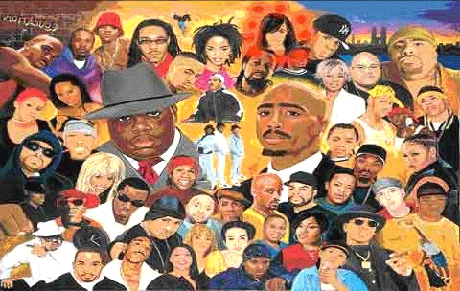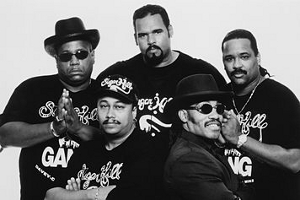Rap music is a style of poetic rhyming set to a heavy percussive beat often including a chorus sung by another performer in the style of traditional pop or rhythm and blues. Rap music is primarily an American medium but in recent years has exploded onto the world stage and rappers can now be found on almost every nation.
Most music fans associate rap music with African American youth from the ghettos, projects, and lower strata of American society, and since most performers come from one of those backgrounds the idea has gained acceptance.
As a style, rap dates back to traditional West African story telling that itself predates the development of the slave trade. Tribal history would be recited in a rhythmic manner to the beat of drums and stamping of feet within the tribal village square and session would often last thru the night or at least into the early morning.

In the US and the Caribbean this style of story telling never really died but wasn’t considered music. During the slave years African Americans clung onto anything that gave them roots leading to rap rightfully being considered a parent style to blues even to the extent of blues singers incorporating rap into songs as far back as the 1920s.
The 1970s in New York was when Rap found it’s way into Hip hop music, initially as a small part of an overall track, and later as the major part of a track with a small Hip Hop component. The first track to enter the billboard charts with a rap sound was the group Last Poets with their debut track ‘Wake Up, Niggers’, a political commentary that accompanied the film “Right On!”
Even in it’s early days rap music was dominated by social issues affecting young African Americans, leading to a bad reputation amongst mainstream communities for its gang culture references. Gangs and prison time are almost synonymous with rap music, one of the Last Poets was himself jailed and not able to perform on their second album a year later.

The first obviously rap track to be released came in 1979 from the Sugerhill Gang whose track ‘Rappers Delight’ hit #36 on the US pop charts and #2 on the US R&B charts. Whilst technically a hip hop song it paved the way for the commercial success of rap as a music style and the group were quickly followed in the charts by Grandmaster Flash, Afrika Bambaataa, and Kool Herc.
Rap in the 80s experienced a major boost in popularity with the first gangsta rap singles catapulting rappers like Ice-T and Niggas With Attitude into the ranks of the all time best rap performers, but leading to controversy over their choice of lyrics and track names. Songs such as Cop Killer and Fuck the Police added fire to the flames giving rap music instant recognition.
By the 1990s rap had fully shaken off its baby cousin reputation against hip hop, artists started experimenting with

new forms and patterns, abandoning the old rap style with inherent structure and moving toward pure rap that snaps from form to form.
Murders and gangster shootings of rap performers has shaken the industry but done nothing to adversely affect the uptake of rap as a mainstream music style. Artists such as Tupac, Shakur Notorious B.I.G., Big L, and Jam Master Jay were all gunned down in drive-by or mafia style murders.
The growth of rap into mainstream has most recently started to encourage performers from outside of its traditional base, people like Eminem, Lil Kim, Salt n Pepa, and Queen Latifah all successfully proving rap isn’t the preserve of black males.
[youtube:http://www.youtube.com/watch?v=xFYQQPAOz7Y]
Comments are closed